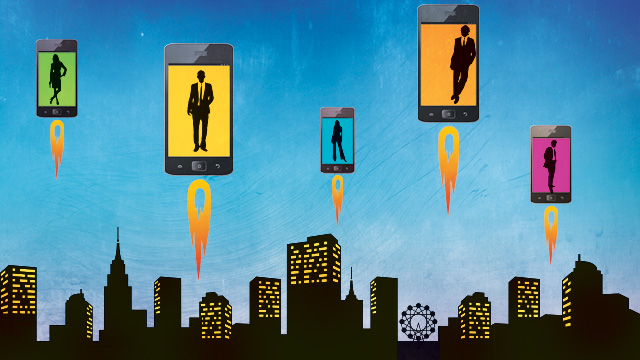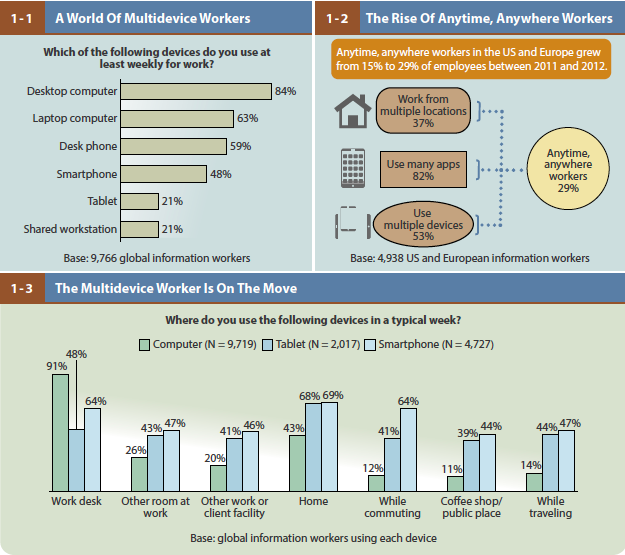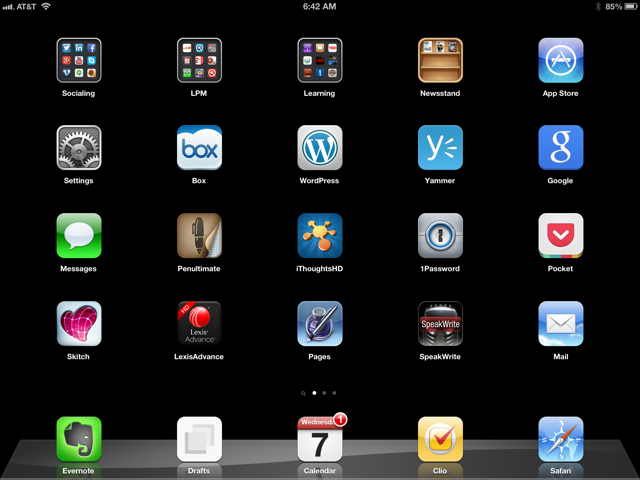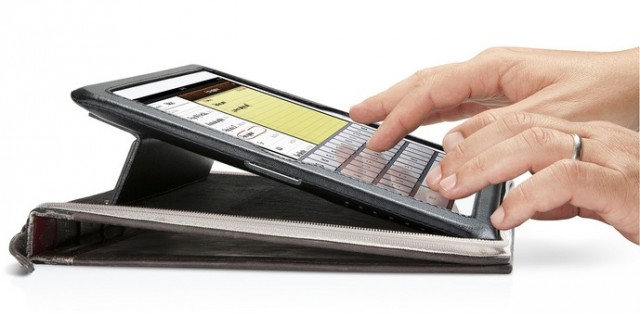
Is the end of the cubicle upon us?
For most people, the answer is "not today," but the mobile worker—rarely in the office, getting most work done on a smartphone, tablet, or laptop—is becoming an increasingly large presence in corporate America.
Take Chad Burton, an attorney who founded Burton Law in Ohio. The members of his eight-lawyer team all work remotely. Burton himself almost never uses what most people think of as a "computer."
"My three main work tools are my iPhone, iPad, and the Moleskine [a paper notebook that integrates with Evernote's iOS app]," Burton said in a phone interview. These devices—along with cloud services and apps for file management, document creation, and other tasks—help Burton "create the same workflow regardless of where I am."
"I'm an early riser. I get those out at four in the morning, get to work, and I can carry that on to the rest of the day," he said. "When we hang up here, I'll crank out some more work before heading to a meeting, and then I'll pick up those three things and head out the door."
Burton's case is a little bit extreme now, but in a few years it may not be. Forrester Research has been tracking the rise of mobile workers, saying in its 2013 Mobile Workforce Adoption Trends report, "Gone are the days when employees wielded a simple set of tools to get work done. In today’s world of anytime, anywhere work, employees use whatever device is most convenient: desktop at home, laptop at work, tablet in a client meeting, or smartphone everywhere."
While people can now work pretty much anywhere, they haven't been able to completely give up more traditional devices. Forrester's survey of 9,766 information workers in 17 countries found that 84 percent of respondents use a desktop computer for work at least once a week, and 63 percent use a laptop every week. Nearly half, 48 percent, of workers use smartphones for business each week and 21 percent do the same with tablets.

More work on smartphones and tablets plus a longer work day
Even if they use a desktop, they're not always at their desk. "None of the numbers we've seen in the past few years indicate the bulk of the workforce is tethered to their desk," Forrester analyst TJ Keitt told Ars. "People do spend time working from home, whether sanctioned or not, people do spend time working on the road either as frequent or intermittent business travelers."
This goes hand in hand with the "elongation of the employees' work day" and the blurring of lines between personal and work lives, he noted.
For most people, the first step toward becoming an anytime/anywhere worker is setting up e-mail on a smartphone, typically connecting to an Exchange server. Next, they'll try viewing documents on the tiny screen and possibly even edit them if they're desperate.
The larger screen of a tablet obviously offers a lot more flexibility, with apps that attempt to replicate the advanced functionality people are used to on PCs. Burton's workflow is a great example.
His firm uses Box, a cloud storage and syncing service, and integrates that with Clio, legal practice management software. While the iPad lacks the type of file manager Windows and Mac users are accustomed to, that isn't a problem for Burton because Box acts as the firm's file system. Instead of attaching documents to e-mails, he just copies and pastes a document's link.

Practicing business law and litigation, Burton spends his time advising companies, drafting contracts, and taking on cases ranging from breach of contract to intellectual property disputes. He estimates he spends an hour or two a day writing, using Apple's Pages application to draft legal documents in Microsoft Word format. While many types of employees cannot do without Microsoft Office because they need perfect compatibility with Microsoft's format, Burton said Pages has done well enough for his purposes.
Burton and his coworkers use DirectLaw, a Web-based platform that makes it possible to deliver legal services online. They also use Yammer, an enterprise social network that serves as the law firm's "water cooler and place to bounce ideas off each other."
Burton has been an iPad user since the original came out in 2010, and he now uses the third-generation iPad with LTE connectivity. He used to carry a Bluetooth keyboard but now just types on the screen and uses voice-to-text dictation.
"I didn't like having that extra piece to carry around, so I just trained myself to type as proficiently on the screen as I do on a keyboard," Burton said.

Burton stopped using his desktop computer on a regular basis three or four months ago. However, he can't just send it to the recycling bin even if most days he only uses mobile devices.
Scanning documents is usually best done with a desktop, he noted. His iMac also keeps local copies of his firm's documents, and Burton needs to use the Mac to upload files to the courts' electronic filing systems. He doesn't have to be in front of his Mac to actually do that, though—he just logs into it from his iPad with the LogMeIn remote desktop management tool.
Most lawyers using tablets aren't using them for much more than e-mail, Burton said. But he's been helping fellow attorneys become more proficient on mobile devices as part of his side gig teaching seminars on using technology in the legal profession.
"This isn't just a shiny object," he said. "It's not just about consumption."
reader comments
80